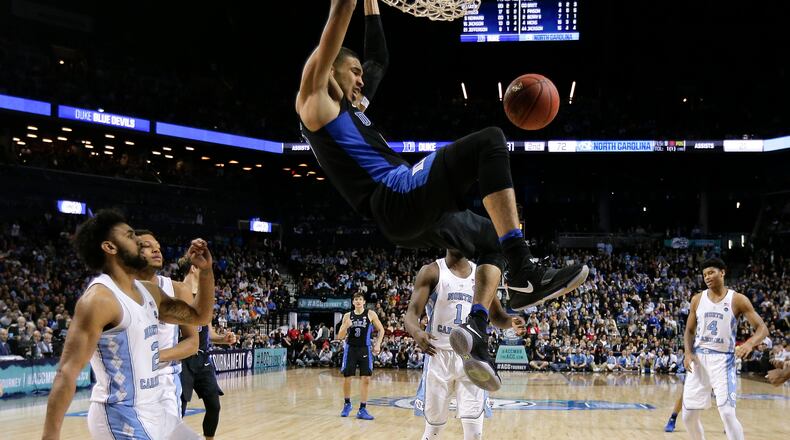Six ACC teams reached the Sweet 16 of last year’s NCAA tournament. (That was a record.) Of the Big Dance’s Elite Eight, the ACC had four. (Tied a record.) Two made the Final Four. North Carolina almost won the national championship.
The conference that brought its showcase event to the borough of Brooklyn — to the chagrin of some, to the delight of Jim Boeheim, who's not easily pleased — this week could place as many as 10 teams in the NCAA's field of 68. That wouldn't be a record: The Big East sent 11 in 2011. Four of those Big Easters are now housed in the league that grew up along Tobacco Road.
In sum, the ACC has become what Mike Krzyzewski predicted before his Duke Blue Devils played in a 2013 regional final in Indianapolis. Quoth Coach K: “For all these schools that have joined, it makes us the most powerful basketball conference, I think, ever.”
Krzyzewski’s appraisal came attached to an admonition: “I hope our league is able to understand the assets that we’ve accumulated and what it does to the assets we already have. I think if positioned properly, it sets us apart from anybody. And we shouldn’t look at where football is or whatever. We have the best assets as a result of Louisville, Syracuse, Pitt, Notre Dame, and the assets we have — we’re joining together. I mean, we better know how to make use of it.”
This was widely and immediately interpreted as the nation’s best basketball coach warning his conference not to do as other major leagues were doing and throw everything into football. (College basketball makes money; college football makes way more.) But a funny thing has happened as ACC basketball has grown from great to greater: ACC football has claimed two — and nearly three — of the past four national championships.
Contrast this, say, with the SEC, which has seen its football product sag — except for Alabama, which admittedly is a massive exception — and has had to commission Mike Tranghese, once the Big East commissioner, to spruce up its basketball product. Regarding roundball, the ACC has never lacked for in-house expertise.
Say what you will — and all of us, from Boeheim to Roy Williams to yours truly, already have — about the ACC moving its tournament to the Big Apple, but at worst it was a move worth trying. More to the point, it was a sign of the ACC's star power. How much interest would there be in the Big 12, which counts West Virginia as a member, playing its conference tournament in Richmond? Or the SEC, which has a Texas outpost, hooping for five days in Dallas?
(Actually, next year’s SEC tournament will be held in St. Louis. The good part is that it’s a short drive for Kentucky fans. The bad is that the event will be solely for Kentucky fans, which is basically the story of every SEC tournament.)
Even with Maryland gone to the Big Ten, the Atlantic Coast Conference spreads from Coral Gables, Fla., to Chestnut Hill, Mass., and as far west as South Bend, Ind. Lost in Boeheim’s dismissal of Greensboro as having “no value” was his declaration that the ACC tournament should be held in New York, D.C. or Atlanta — which are, you’d have to say, radically different places. But that’s what the ACC has become. ACC basketball can and will travel.
And it's not just Duke versus North Carolina, though their meetings always attract massive interest. (Friday's semifinal, which Duke won by 10 after trailing by 13, was among the great Talking Point games in recent collegiate history.) But the familiar Tobacco Road domination has faded. The ACC basketball champs from 2012 through 2015: Florida State, Miami, Virginia and Notre Dame. The top four seeds in this week's event: Carolina, Florida State, Notre Dame and Louisville.
This isn’t to say the super-sized ACC has been super in every way. Syracuse missed the 2015 postseason because of NCAA sanctions. Louisville removed itself from the 2016 postseason because of the storm over strippers in its athletic dorm. The never-ending probe into North Carolina academics has drawn a third — yes, a third — notice of allegations from the NCAA’s infractions committee, newly prodded by SEC commissioner Greg Sankey. The second notice dropped Carolina basketball and football; the third included both.
And, for all the furor over Greensboro vis-à-vis Brooklyn, the cold truth is that the ACC will have a hard time staging any event in North Carolina so long as House Bill 2 — the bathroom-rights act — remains in place. The league’s 2016 football championship was moved from Charlotte to Orlando. The NCAA shifted the first- and second-round games set for No Value Greensboro to Greenville, S.C. The ACC is on record as decrying HB2; the ACC also is headquartered in North Carolina.
Ours is not a perfect world, and our sports world includes no perfect leagues. Over time, the ACC’s Brooklyn experiment — it will return here next year — might well be seen as a mistake. But this conference, in basketball but not just basketball, has become too big to fail. If Carolina doesn’t win the NCAA title, Duke probably will. If neither do, Louisville might. If not Louisville, maybe Notre Dame.
Oh, and the top two finishers in the voting for the 2016 Heisman Trophy, which was presented just across the East River? They were ACC guys, too.
About the Author
Keep Reading
The Latest
Featured



